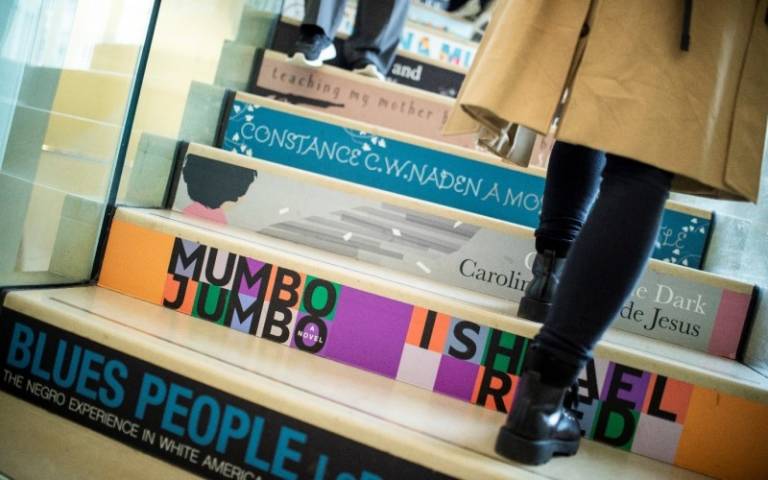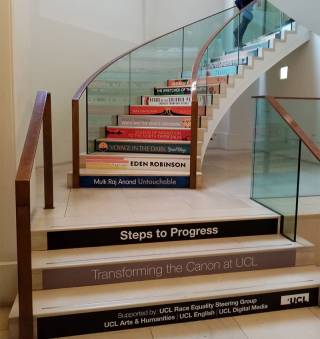Book Recommendations from Disability History Month 2023
15 January 2024
A list of book recommendations on the subject of inclusion and the history of the struggle for equality and human rights for disabled people.

During Disability History Month 2023 we asked members of the UCL disabled student and staff networks to recommend books on the subject of inclusion and the history of the struggle for equality and human rights for disabled people. We have included the list of recommendations below.
Library Services recognises the social model of disability which says that people are disabled by barriers in society, not by their impairment or difference. We are committed to removing barriers that may prevent students, staff or library visitors from making the most of our services.
Your recommendations
How many have you read? Share your own recommendations through the online form or on Instagram.
Being Heumann: The Unrepentant Memoir of a Disability Rights Activist by Judith Heumann and Kristen Joiner
“It shows how one person can make a big difference in the world, along with the power of different minority groups supporting each other.”
Ableism in Academia edited by Nicole Brown and Jennifer Leigh (Published by UCL Press)
The contributors of this book theorise and conceptualise what it means to be/work outside the stereotypical norm in the neo-liberal university.
The black book of colours by Menena Cottin and Rosana Faría (translated by Elisa Amado)
This book tries to convey the experience of a person who can see only through their sense of touch, taste, smell or hearing through textured artwork on black paper, accompanied by a beautifully written text translated into braille.
Living with hearing loss and deafness: a guide to owning it and loving it by Samantha Baines
This book is about how to understand, live and thrive with hearing loss. Featuring the author's own experiences of deafness and interviews with deaf activists, RNID, audiologists, and people who use and teach sign language.
The future is disabled: Prophecies, Love Notes and Mourning Songs by Leah Laksmi Piepzna-Samarasinha
“This is a wonderful book about disability justice and the ethics of care. The author asks some provocative questions: What if, in the near future, the majority of people will be disabled - and what if that's not a bad thing? And what if disability justice and disabled wisdom are crucial to creating a future in which it's possible to survive fascism, climate change, and pandemics and to bring about liberation?”
Sinéad Murphy
There Plant Eyes: A Personal and Cultural History of Blindness by M. Leona Godin
“To learn how much our society is ocularcentric, to contribute and drive a change, so that it becomes more inclusive. But also to enjoy the beautiful writing style of the author.”
Valeria
Annie's Coming Out by Rosemary Crossley and Anne McDonald
“It shockingly highlights people's attitudes in a certain decade.”
Haben: The Deafblind Woman Who Conquered Harvard Law by Haben Girma (Recommended twice)
Haben Girma is an advocate for equal opportunities for people with disabilities. Her memoir tells the story of her struggle for inclusion and connection.
Demystifying Disability: What to Know, What to Say, and How to Be an Ally by Emily Ladau
Emily Ladau has written a practical guide that offers readers a welcoming place to understand disability as part of the human experience. It offers an approachable guide to being a thoughtful, informed ally to disabled people, with actionable steps for what to say and do (and what not to do) and how you can help make the world a more inclusive place.
Born Deaf to an MBE by Shezad Nawab
Shezad Nawab is a highly successful businessman. He was born profoundly deaf and uses British Sign Language to communicate. The book chronicles his professional career and seeks to inspire the differently abled to bring innovation to the business world.
Deaf utopia: A memoir - and a love letter to a way of life by Nyle DiMarco
The memoir of Deaf activist and winner of America’s Next Top Model, Nyle DiMarco shares stories about what it means to navigate a world built for hearing people.
We're Not Broken: Changing the Autism Conversation by Eric Garcia
The author Eric Garcia wrote this book to show what life is like on the spectrum. As an autistic person, he felt his own life didn’t look like the stereotypical portrayals in the media. He argues that autistic people face systems that weren’t built with them in mind.
Against Technoableism: Rethinking Who Needs Improvement by Ashley Shew
Ashley Shew’s manifesto argues that disabled people are the real experts when it comes to technology and disability. She writes that the future is disabled and we should see disabilities not as liabilities but as skill sets enabling all of us to navigate a challenging world.
Sensory: Life on the spectrum: an autistic comics anthology by Bex Ollerton
This comics anthology, co-produced with autistic contributors, explores a wide range of experiences from diagnosis journeys to finding community.
British Sign Language: Teach Yourself by Paul Redfern & Deafworks
British Sign Language (BSL) was created by the British Deaf community. It is the first or preferred language of the community. According to estimates from the British Deaf Association, there are 151,000 BSL users in the UK. This book is one of many good introductions to learning this important language.
Poor Little Sick Girls: A love letter to unacceptable women by Ione Gamble
Poor Little Sick Girls explores the pressures faced - as well as the power of existing as - a chronically ill, overweight, and unacceptable woman in our current era of empowerment.
Thanks to everyone who contributed to this list.
Equality, Diversity and Inclusion in UCL Library, Culture, Collections and Open Science

Support at UCL
Support for Students
- UCL Student Support & Wellbeing: Information for disabled students
- Advocacy workshops for disabled students
- Students’ Union UCL: Disabled Students Network
Support for Staff
- Adjustments Passport
- Digital Accessibility Services
- Equality, Diversity and Inclusion: Disability Equality
- HR Business Partners
- UCL Disability guidance for Disabled and Neurodivergent staff and line managers
- Workplace Health
- Enable@UCL, the university’s staff network open to any disabled person working at UCL as well as any non-disabled person with an interest in promoting disability equality at UCL.
 Close
Close

